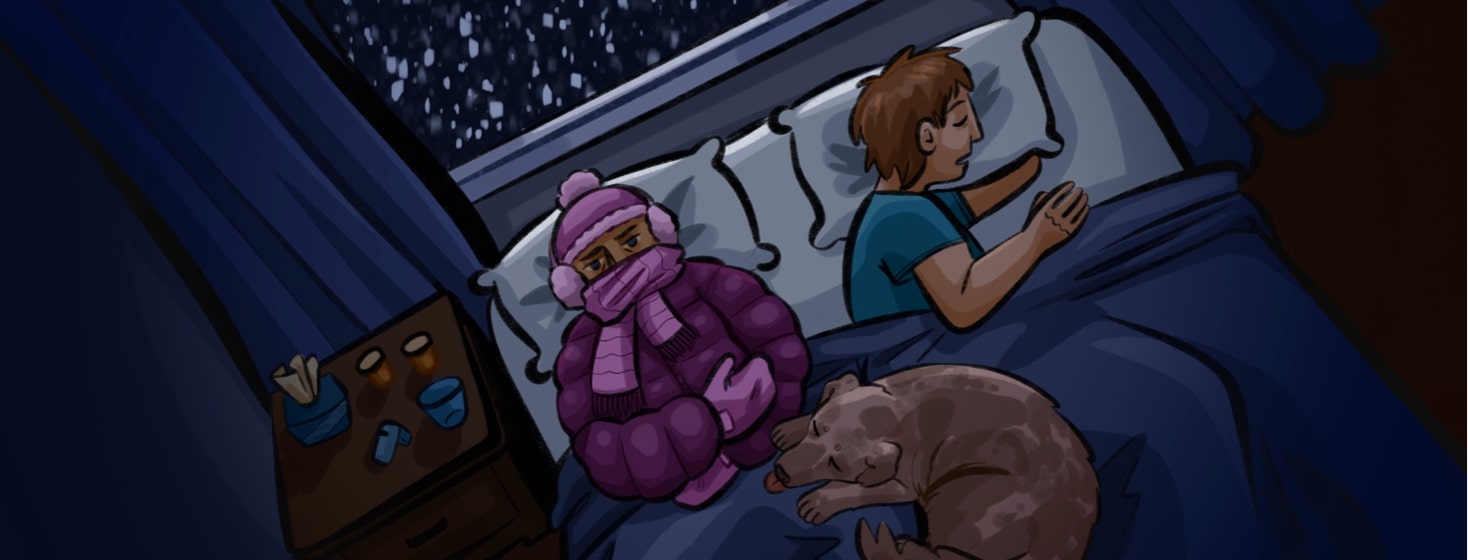Winter Cold(s), Antihistamines, and RLS
Winter is my least favorite season.
I have a friend who loves it, and I sometimes question her sanity on that one. She and I live in Canada, and currently here it is -44 degrees Celsius with the windchill (-32C without the windchill). That doesn't make me do a happy dance, unless I am slipping on ice and trying to catch myself — that sort of looks like a weird dance.
I spend most of the time catching every single cold and flu within a 2-mile radius of me. That’s how awesome my immune system is.
A severe, lingering respiratory infection
This year there have been some particularly horrible respiratory colds going around and a bad flu season, not to mention the fact that COVID is still a factor. My spouse just got over COVID, but thankfully I didn’t get a second run of that.
Unfortunately, I did get a severe respiratory infection that lasted a long time because my lungs are still recovering from COVID. And literally, as I write this, I have actually come down with yet another cold, but I seriously hope it is not as severe.
The cold, allergies, and asthma
A cold is not just a cold when it goes into the lungs for me. Not with asthma, and not with allergies and asthma. The reason a respiratory cold can last so long and sometimes get quite severe is because the asthma complicates things.
Basically, it means taking 3 times the normal amount of my asthma medication, extra sinus medication, and more antihistamine medication. This go-around, it was the same deal, except it was a prescription nasal spray, a prescription strength antihistamine, and the maximum amount of my asthma medication to manage the respiratory situation.
Getting sick while living with RLS
When I’m sick, my restless legs syndrome (RLS) tends to flare up. Not cool to jump on the sick wagon, really, but it does. I assume the flare-up happens because I feel achy, sore, and feverish (or just hot and tired), and I just can’t sleep well as result. Or because I’m coughing so much that I just sleep so little.
The less sleep I get, the worse the RLS gets, and the earlier the onset is. And also, it's way more likely for it to hit me in the arms and hands as well.
Some cold and flu medications can worsen RLS
When a cold gets me in the lungs and I need all that extra medication, that is what makes the RLS go completely off the charts. I am really not sure what is worse at that point. Obviously, I need to manage the respiratory infection from getting worse. But I really do not dig the insanity that RLS gets to when you take higher levels of antihistamines.
That increase in RLS symptoms really affects my sleep, which then makes the RLS worse the next night, too. And that is really not a cool cycle.
Less is more when it comes to antihistamines
My respiratory specialist for COVID recovery recently mentioned I should go on prescription antihistamines. Now I know that definitely is not a good idea.
I had to increase my RLS medication just so I could get the RLS down to a non-painful level. But it never stopped. It was at a constant buzz that made me very twitchy.
I have definitely come to the conclusion that less is more when it comes to antihistamines. I do get that I need to take them to help manage my asthma, but less is more. I want to get the benefits of the medication without the RLS consequences. I can take them in the early morning, and it doesn't affect my RLS as much at night, then.
Now, if I could just grow a better immune system, I would be set.

Join the conversation